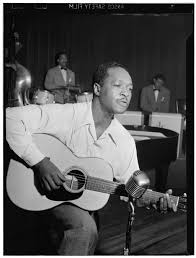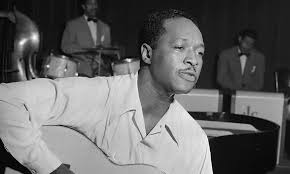Early Life and Musical Beginnings
Joshua Daniel White was born on February 11, 1914, in Greenville, South Carolina. Growing up in the racially segregated South, he was exposed to gospel, blues, and folk music from an early age. His father, a minister, was institutionalized after a violent encounter with police, forcing young Josh to help support his family. As a child, he worked as a “guide” for traveling blind musicians, including blues legend Blind Lemon Jefferson, which profoundly influenced his musical development.
Rise to Fame
In the late 1920s and early 1930s, White transitioned from being an accompanist to a solo performer. His first recordings, made under the name “Pinewood Tom,” showcased a raw, country blues style. However, as he refined his technique and vocal delivery, he developed a more polished, urban blues and folk style that resonated with a broader audience.
By the 1940s, White had become one of the most prominent African American folk-blues musicians in the United States. His smooth yet emotive voice, combined with his intricate guitar playing, distinguished him from his contemporaries. Songs like One Meat Ball, House of the Rising Sun, and Strange Fruit showcased his ability to blend storytelling with social commentary. He was one of the first black artists to gain mainstream recognition in both white and black audiences, performing in prestigious venues such as Carnegie Hall.
Activism and Political Challenges
Josh White was not just a musician; he was also a passionate advocate for social justice. He used his music to highlight racial and economic injustices, often collaborating with leftist and progressive figures. He became closely associated with figures like Eleanor Roosevelt and performed at the White House for President Franklin D. Roosevelt, making him one of the first black artists to receive such an honor.
However, his activism came at a cost. During the Red Scare of the 1950s, White was blacklisted due to his alleged communist sympathies. Although he denied any formal political affiliations, his association with progressive movements and his outspoken nature made him a target. His career suffered greatly, and he struggled to book performances in the United States. Despite this setback, he continued to perform internationally, particularly in Europe, where he was widely celebrated.
Later Years and Legacy
White managed to regain some of his former popularity in the 1960s as the folk revival movement gained momentum. Younger artists, influenced by his style and activism, helped reintroduce his music to a new generation. His later recordings and performances, though less commercially successful, still showcased his enduring talent and commitment to storytelling through music.
Josh White passed away on September 5, 1969, leaving behind a lasting impact on American music. He was a trailblazer who bridged the gap between blues, folk, and social activism, paving the way for future artists like Harry Belafonte, Bob Dylan, and Richie Havens.
Influence on Music and Society
White’s legacy extends beyond his music. He broke racial barriers in the entertainment industry, bringing blues and folk to integrated audiences long before the Civil Rights Movement gained traction. His unique blend of social consciousness and musicianship influenced countless artists, proving that music could be both beautiful and a powerful tool for change.
Today, Josh White is remembered as a pioneering artist who used his voice and guitar to challenge injustice and inspire generations of musicians. His contributions to blues, folk, and civil rights continue to resonate, making him a true icon in American musical history.


Comments are closed